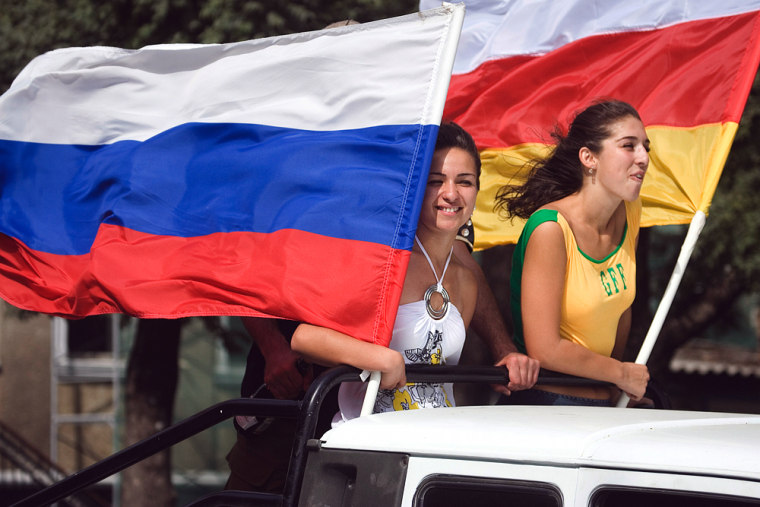A big poster of Russian leader Vladimir Putin greets visitors to the capital of separatist-held South Ossetia — a clear signal of what most residents hope is to come.
Both chambers of Russia's parliament passed resolutions Monday urging the Kremlin to recognize South Ossetia's independence, and residents of the breakaway region overwhelmingly agreed. Many here see independence from Georgia as the first step to becoming part of Russia.
"Ossetians have no doubts — we'll only be with Russia," said Robert Bestayev, 36, a beaming South Ossetian military communications officer with a tiny Russian flag on the lapel of his worn-out gray suit. "It has already happened, now is the time to confirm it."
While Russia's formal annexation of what is now considered Georgian territory would further split Moscow from the West, South Ossetians see incorporation into the Russian Federation as a way to guarantee they never come under Georgian rule again.
Russia says it would spend millions restoring South Ossetian infrastructure and its economy — a pledge that makes absorption into Russia even more desirable.
'We'll die without Russia'
Most here recognize that South Ossetia, by itself, is too small — it's the size of Rhode Island and has a population of about 70,000 — and too poor to survive very long on its own.
"We'll die without Russia," said Yuza Valiyeva, a 58-year-old nurse. "What is independence? Who would protect us if were are independent?"
She spoke standing next to the ruins of her one-story house in downtown Tskhinvali where, she said, Georgian shelling destroyed its roof and two walls.
The fighting erupted Aug. 7, when Georgia tried to retake Tskhinvali by force. Russian troops overwhelmed the Georgians, and for nearly two weeks occupied positions deep within Georgia.
The war has brought relations between Russia and the West to a post-Cold War low, and the Kremlin would certainly raise tensions further by recognizing the declared independence of South Ossetia and another breakaway Georgian region, Abkhazia.
South Ossetian President Eduard Kokoity said his region's independence was indisputable. "We have more of a right to recognition than Kosovo," he told Russian lawmakers Monday.
Kosovo declared independence from Serbia in February, a move recognized by the U.S. and the European Union, but hotly disputed by Serbia and Russia.
Both South Ossetia and Abkhazia won de facto independence in the 1990s after wars with the Georgians, and have survived ever since with Russian support.
"So far, we insist on independence," South Ossetian Foreign Minister Marat Jioyev said. "But for more than two centuries, the Ossetian people looked to Russia."
Ethnic Ossetians divided years ago
Russia has dominated affairs in the ethnic cauldron of the Caucasus Mountains region for centuries — vying for influence with Turkey, Iran and Britain.
When the Soviets carved the former Russian empire into regions, they divided the ethnic Ossetians. South Ossetia became a semiautonomous part of the Georgian Soviet republic, while North Ossetia reported to Moscow directly.
Georgia, however, maintains that the territory of the breakaway region is an ancient Georgian principality.
Ossetians claim Georgians have been trying to eliminate and assimilate them throughout the 20th century, especially in last years of the Soviet Union, when Georgian leaders sought to scrap Ossetian autonomy.
"Through suffering, we have earned the right for life without Georgia," said Soslan Besayev a 40-year-old worker at a bread factory. "We've been fighting for this throughout the 20th century."
